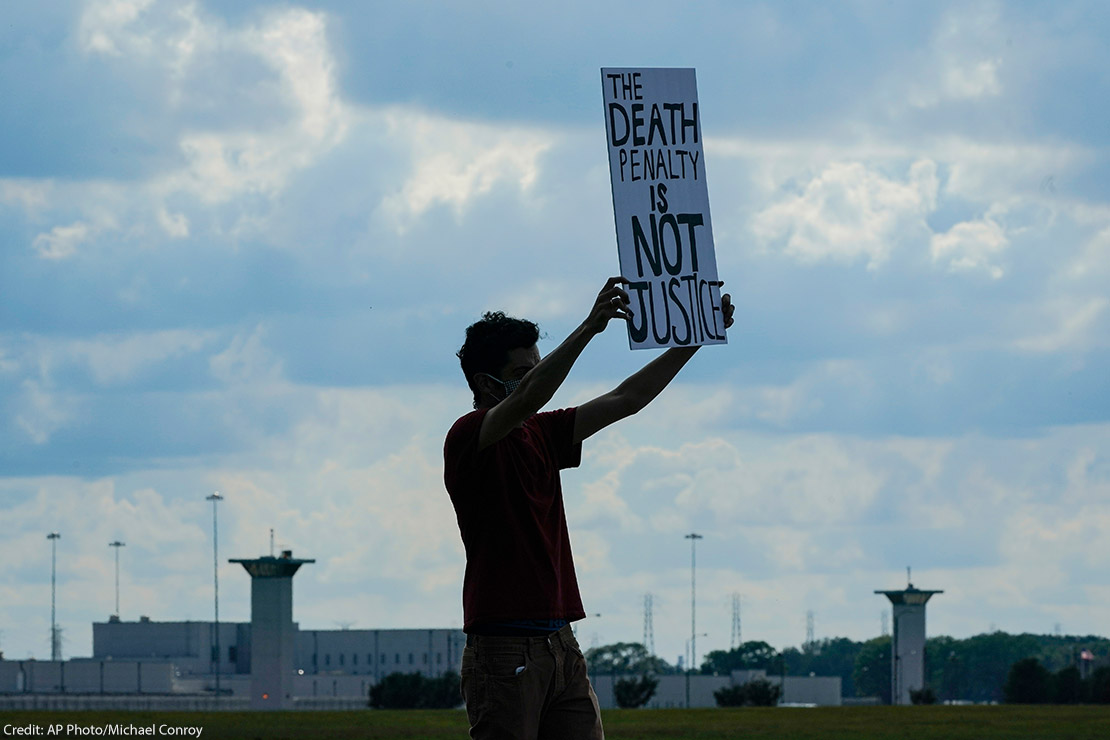Prosecutorial Misconduct and Capital Punishment
Glossip v. Oklahoma
This long-running Oklahoma death-penalty case raised two issues:
1) Would the State of Oklahoma be permitted to execute Glossip, despite overwhelming evidence that he is innocent, and despite a confession by the State’s Attorney General that the state obtained his conviction by hiding crucial evidence impeaching its star witness?; and
2) Would the Court reaffirm its longstanding commitment to Due-Process-Clause precedent requiring the government to disclose favorable evidence in its possession to the accused and to correct false testimony introduced against the accused?
Status: Closed (Judgment)
View Case
Learn About Prosecutorial Misconduct and Capital Punishment
All Cases
5 Prosecutorial Misconduct and Capital Punishment Cases

U.S. Supreme Court
Jul 2025
Prosecutorial Misconduct and Capital Punishment
Tabler v. Lumpkin
In Tabler v. Lumpkin, the ACLU represented a Texas death row prisoner whose lawyers refused to represent him at a hearing to determine his capacity to decide whether to give up his state post-conviction appeals, leaving him effectively unrepresented at that hearing. Our petition asked the Supreme Court to review Richard Tabler’s case and to hold that when a defendant’s lawyers abandon him, his waiver of further appeals should not bar his access to federal habeas corpus review of the constitutionality of his conviction.
Explore case
U.S. Supreme Court
Jul 2025

Prosecutorial Misconduct and Capital Punishment
Tabler v. Lumpkin
In Tabler v. Lumpkin, the ACLU represented a Texas death row prisoner whose lawyers refused to represent him at a hearing to determine his capacity to decide whether to give up his state post-conviction appeals, leaving him effectively unrepresented at that hearing. Our petition asked the Supreme Court to review Richard Tabler’s case and to hold that when a defendant’s lawyers abandon him, his waiver of further appeals should not bar his access to federal habeas corpus review of the constitutionality of his conviction.

Massachusetts Supreme Court
Dec 2023
Prosecutorial Misconduct and Capital Punishment
Graham v. Hampden County District Attorney
Federal and state constitutional law requires prosecutors to inquire into and disclose misconduct by members of their prosecution teams. In Massachusetts, the Supreme Judicial Court has applied those principles, and others, in cases that have led to the mass exoneration of people convicted of drug crimes with the assistance of former state chemists who committed misconduct. In Graham, the ACLU and public defenders are asking the Massachusetts Supreme Judicial Court to apply those same principles to a situation where the U.S. Department of Justice has alleged a pattern or practice of misconduct by members of a police department—specifically, the Narcotics Bureau of the Springfield (MA) Police Department. The Springfield investigation was the DOJ’s sole pattern-or-practice investigation during the Trump Administration, but the DOJ has opened several such investigations during the Biden Administration. Graham appears to be the first state supreme court case in the country to consider whether DOJ pattern-or-practice findings can trigger duties under state law to investigate and disclose the misconduct alleged by the DOJ. In a major victory, the Massachusetts Supreme Judicial Court ruled in January 2024 that the Hampden County District Attorney’s Office violated its duties to disclose and inquire about exculpatory evidence of widespread misconduct by Springfield police.
Explore case
Massachusetts Supreme Court
Dec 2023

Prosecutorial Misconduct and Capital Punishment
Graham v. Hampden County District Attorney
Federal and state constitutional law requires prosecutors to inquire into and disclose misconduct by members of their prosecution teams. In Massachusetts, the Supreme Judicial Court has applied those principles, and others, in cases that have led to the mass exoneration of people convicted of drug crimes with the assistance of former state chemists who committed misconduct. In Graham, the ACLU and public defenders are asking the Massachusetts Supreme Judicial Court to apply those same principles to a situation where the U.S. Department of Justice has alleged a pattern or practice of misconduct by members of a police department—specifically, the Narcotics Bureau of the Springfield (MA) Police Department. The Springfield investigation was the DOJ’s sole pattern-or-practice investigation during the Trump Administration, but the DOJ has opened several such investigations during the Biden Administration. Graham appears to be the first state supreme court case in the country to consider whether DOJ pattern-or-practice findings can trigger duties under state law to investigate and disclose the misconduct alleged by the DOJ. In a major victory, the Massachusetts Supreme Judicial Court ruled in January 2024 that the Hampden County District Attorney’s Office violated its duties to disclose and inquire about exculpatory evidence of widespread misconduct by Springfield police.

U.S. Supreme Court
Aug 2013
Prosecutorial Misconduct and Capital Punishment
+2 Issues
Kansas v. Cheever
Whether the Fifth Amendment imposes any limits on the state's ability to introduce evidence derived from a court-ordered psychiatric examination of the defendant by the state's expert.
Explore case
U.S. Supreme Court
Aug 2013

Prosecutorial Misconduct and Capital Punishment
+2 Issues
Kansas v. Cheever
Whether the Fifth Amendment imposes any limits on the state's ability to introduce evidence derived from a court-ordered psychiatric examination of the defendant by the state's expert.

Court Case
Jan 2012
Prosecutorial Misconduct and Capital Punishment
Galloway v. Mississippi
In a petition for certiorari filed in the U.S. Supreme Court, the ACLU is challenging a death sentence the State of Mississippi obtained against Mississippi death row prisoner Leslie Galloway, who was sentenced to death in 2010 for the murder of Shakeylia Anderson. The State convinced the jury to have Mr. Galloway executed by forbidding it from hearing anything about the harsh conditions Mr. Galloway would face in a Mississippi prison if the jury chose a sentence of life imprisonment without parole instead of execution.
Explore case
Court Case
Jan 2012

Prosecutorial Misconduct and Capital Punishment
Galloway v. Mississippi
In a petition for certiorari filed in the U.S. Supreme Court, the ACLU is challenging a death sentence the State of Mississippi obtained against Mississippi death row prisoner Leslie Galloway, who was sentenced to death in 2010 for the murder of Shakeylia Anderson. The State convinced the jury to have Mr. Galloway executed by forbidding it from hearing anything about the harsh conditions Mr. Galloway would face in a Mississippi prison if the jury chose a sentence of life imprisonment without parole instead of execution.
